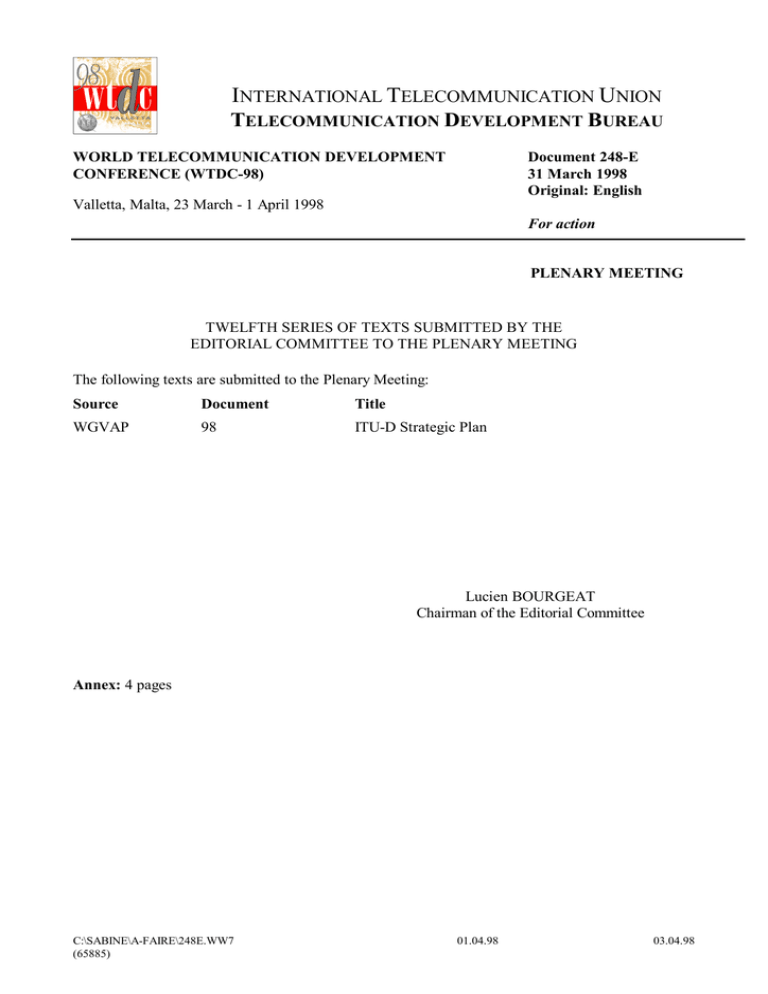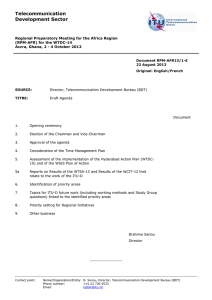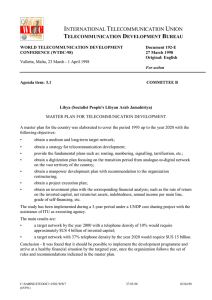I T U D
advertisement

I NTERNATIONAL TELECOMMUNICATION UNION TELECOMMUNICATION DEVELOPMENT BUREAU Document 248-E 31 March 1998 Original: English WORLD TELECOMMUNICATION DEVELOPMENT CONFERENCE (WTDC-98) Valletta, Malta, 23 March - 1 April 1998 For action PLENARY MEETING TWELFTH SERIES OF TEXTS SUBMITTED BY THE EDITORIAL COMMITTEE TO THE PLENARY MEETING The following texts are submitted to the Plenary Meeting: Source Document Title WGVAP 98 ITU-D Strategic Plan Lucien BOURGEAT Chairman of the Editorial Committee Annex: 4 pages C:\SABINE\A-FAIRE\248E.WW7 (65885) 01.04.98 03.04.98 -2CMDT98/248-E ITU-D STRATEGIC PLAN [Sections 28.3, 29.3, 30.3 and 31.3 of Document 75 retained without change.] G.1 43 The Development Sector mission The mission of the Development Sector, as set out in the Constitution and the Convention, encompasses the Union’s dual responsibility as a United Nations specialized agency and executing agency for implementing projects under the United Nations development system or other funding arrangements, so as to facilitate and enhance telecommunication development by offering, organizing and coordinating technical cooperation and assistance activities. The work of ITU-D will reflect the various resolutions of the world telecommunication development conference. It will place emphasis on gender balance in its programmes and will reflect the needs of other aspects of global society such as youth and the needs of indigenous peoples. Emergency telecommunications is another area where renewed efforts are required. Collaboration with the private sector should be more clearly defined and expanded so as to reflect the changing roles of public and private entities in the telecommunication sector. The "Year 2000" problem should be urgently addressed. ITU-D should also use the mechanisms for advancing Sector goals included in Opinion B of the World Telecommunication Policy Forum (Geneva, 1998) and the opportunities provided by the ITU programme funded by the surplus funds from TELECOM exhibitions. In fulfilling its mission, ITU-D will cover the five major areas of telecommunication development: telecommunication sector reform, technologies, management, finance and human resources. It is supported by the four main modes of action by which the Sector carries out its work: direct assistance (including project execution), resource development and mobilization, partnerships and information sharing, which are reflected in the organizational structure of BDT. G.2 44 The Telecommunication Development Sector environment The telecommunication development environment is characterized by the following features: • The restructuring and liberalization of the telecommunication sector at the national and international level, and the three agreements on basic telecommunications, technology and finance concluded through the World Trade Organization, have increasing consequences for the provision of international and national telecommunication services. Competition is rapidly becoming the rule rather than the exception. • The above factors are straining the accounting rate system beyond its limits, calling for a rapid revision of accounting rates and causing major changes in traditional income flows which are of critical importance to certain countries. C:\SABINE\A-FAIRE\248E.WW7 (65885) 01.04.98 03.04.98 -3CMDT98/248-E • While the development gap has narrowed slightly in terms of access to basic telephone services, it is widening at a fast rate for advanced telecommunication services and access to information. • However, the emergence of a global information society is creating new opportunities to close the gap. Political, technical and cultural factors are combining to promote these opportunities. • The rapid development of telecommunications in some countries is associated with general economic growth, particularly where some form of restructuring, liberalization and competition is introduced; however, other countries witness modest and uneven progress. • Many different development players, including non-governmental organizations (NGOs), are invited to play a more important role. • Business practices, including development activities, are being revolutionized by information and communication technologies. This can be expected to have a significant impact on telecommunication development activities such as planning and training. • Technology-based convergence of telecommunications, informatics and mass media offers new opportunities for cooperation between the formerly different parts of the telecommunication sector. • Due to increased emphasis on policy and regulatory frameworks that create open markets and encourage private investment, both domestic and foreign, development programmes rely less on technical assistance and more on partnerships and trade agreements. Private capital flows in several countries now exceed official development aid resources, but in others concessional finance is required to meet development needs. • Limited funds available to ITU, as compared with developing country needs, require ITU to play a catalytic development role. This envisioned catalytic role of ITU is developed further below. G.3 45 The Development Sector strategy The following points define a strategy for the Development Sector that is consistent with its mission and the changing telecommunication environment. ITU-D will: • pay special attention to the requirements of the developing countries, with particular emphasis on the least developed among them, and the need for well-differentiated and tailored responses to situations arising in transition economies, countries affected by conflicts or natural disasters, etc.; • work with governments to assist them in establishing appropriate telecommunication policies and regulatory structures. Strategies for the development of telecommunications may be fostered by liberalization, private investment and competition in appropriate circumstances. The goal of these policies and structures should be to: C:\SABINE\A-FAIRE\248E.WW7 (65885) 01.04.98 03.04.98 -4CMDT98/248-E – create a stable and transparent environment to attract investment and guarantee the rights of users, operators and investors; – facilitate access of service providers to the telecommunication network within a framework that promotes fair competition while protecting network integrity; – ensure the provision of universal access and universal service, promoting innovation and the introduction of new services and technologies to unserved and under-served users; – promote partnerships and cooperation between telecommunication entities in developing and developed countries, and with appropriate international institutions, consistent with their respective interests; • play a creative catalytic role in identifying and providing resource support, in the new telecommunication environment, to help meet the requirements of developing countries in close collaboration with global, regional and national organizations and agencies and the private sector; • maintain close cooperation with ITU-R and ITU-T reflecting the significant role played by those two Sectors in telecommunication development; • include information technology and broadcasting in its activities, as key factors in promoting economic, social and cultural development; • promote training in human resources development and human resources management in order to meet the challenges of the rapidly changing telecommunication environment; • seek innovative ways to rationalize its internal costs, optimize its resources and improve efficiency. G.4 Priorities of the Development Sector The experience of four successful years has given the Development Sector a solid basis from which to forecast the following priorities for 1999-2003: • respond effectively, rapidly and in a flexible way to requests for direct assistance from developing countries, especially LDCs; • develop and mobilize resources, including human and financial, in particular TELECOM surplus funds, technology, HRD/HRM tools and systems, information and expertise for telecommunication development; • create partnership arrangements that benefit all parties, avoiding purely commercial approaches and concentrating on long-term benefits (as opposed to short-term gains) by establishing strategic alliances and cooperation agreements with other concerned international and regional organizations; • promote partnership arrangements in and between the public and private sectors in both developed and developing countries; C:\SABINE\A-FAIRE\248E.WW7 (65885) 01.04.98 03.04.98 -5CMDT98/248-E • strengthen the ITU regional presence and enhance collaboration with regional and subregional telecommunication organizations, including broadcasting organizations; • collaborate with the private sector in implementing the Valletta Action Plan, including partnerships with related entities in developing countries; • improve the working methods of the Sector, to strive for: – greater use of user-friendly document exchange capabilities; – greater participation by Sector Members and other organizations in ITU-D activities; – the accelerated development of outputs and improvement of publication mechanisms, in particular through the wider use of information technology; – a flexible organizational structure in the Bureau, with special attention to the training and development of BDT staff. During the period 1999-2003, the strategic processes of the Development Sector will incorporate all resolutions and recommendations adopted by this Conference, as well as all other relevant ITU resolutions and recommendations of ITU conferences. C:\SABINE\A-FAIRE\248E.WW7 (65885) 01.04.98 03.04.98

